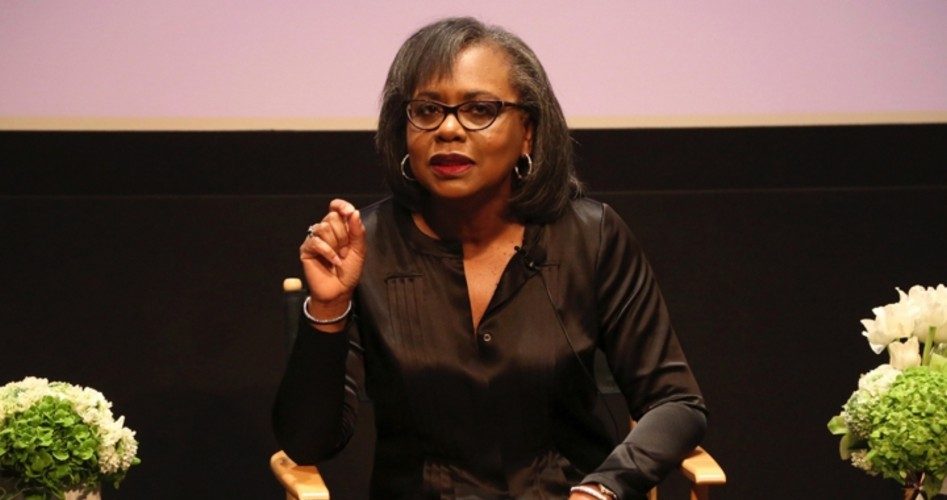
It is really not news that Anita Hill (shown) — who leveled a last-minute sexual-harassment claim against then-Supreme Court nominee Clarence Thomas in 1991 — has weighed in, arguing that Supreme Court nominee Brett Kavanaugh needs to be investigated. Kavanaugh now faces 11th-hour accusations of actual sexual assault from an incident that allegedly took place 35 years ago, when Kavanaugh was in prep school.
Like Kavanaugh’s accuser, Christine Blasey Ford, Anita Hill was a professor when she made her charges against Thomas in a last-minute effort to derail his confirmation. And like Ford — who has made political donations to Senator Bernie Sanders’ presidential campaign, to the Democratic National Committee, and to the Democratic Congressional Campaign Committee — Hill was, and still is, a committed liberal Democrat.
Hill told Politico that the Senate Judiciary Committee should create a process so sexual misconduct allegations against judicial nominees can properly be heard. (Perhaps as part of that process, accusers should provide substantive evidence, make the accusation first in private, and submit the information earlier in the process rather than waiting until the vote on the nominee is ready to be taken.) The woman, Hill insisted, should get a “fair and neutral” investigation.
Note that Hill says the accuser should get a “fair and neutral” investigation, but nothing is said about the rights of the nominee, whose reputation can be destroyed by a mere accusation.
“The reluctance of someone to come forward demonstrates that even in the #MeToo era, it remains incredibly difficult to report harassment, abuse or assault by people in power,” Hill said in a statement. “Given the seriousness of these allegations, the government needs to find a fair and neutral way for complaints to be investigated.”
Ford is presently a psychology professor at Palo Alto University in California; at the time of her allegations against Thomas, Hill was a law professor at the University of Oklahoma. Now, Hill is a professor of law, social policy, and gender studies at Brandeis University.
Hill did not accuse Thomas of sexual assault, but rather said that Thomas had repeatedly sexually harassed her during her tenure at the Department of Education while Thomas was her boss, then again when she followed him (at her request) to the Equal Employment Opportunity Commission (EEOC).
Thomas denied all of Hill’s accusations. “I cannot imagine anything that I said or did to Anita Hill could have been mistaken for sexual harassment.… I have not done what she has alleged, and I still do not know what I could have possibly done to cause her to make these allegations.”
Several former employees, mostly women, rallied to Thomas’ defense, and combined with Thomas’ powerful refutation of Hill’s charges, public opinion swung dramatically in his favor. At the close of the hearing, about two-thirds of Americans polled thought Thomas, not Hill, was telling the truth. But, of course, the liberals did not give up, even after Thomas took his place on the court. By the end of 1992, the public now believed Hill, 53-37 percent.
Thomas had hired Hill at the Department of Education as a favor to a friend. During the interview, Thomas asked for her opinion on President Ronald Reagan. “I detest him,” Hill responded, summarizing her liberal political views, which have never changed. Later, she asked Thomas if she could go with him to the EEOC. “You’re a rising star,” Hill explained, when Thomas tried to dissuade her. Eventually, she took a job at Oral Roberts University’s law school in Tulsa.
Three years later, she contacted Thomas and asked him to speak at an EEO function in Tulsa. After the conference, she asked to drive Thomas back to the airport the next morning. “She was excited about [her new] car and seemed happy.… She called me from time to time after that, but so far as I can remember, I never saw her again.”
Thomas’ secretary, Diane Holt, confirmed that Hill made multiple phone calls to Thomas over the years — 11 of which were recorded. One time while visiting D.C., Hill even called and left a message for Thomas that she was in town, giving her hotel room number.
Only Anita Hill knows why she repeatedly called Thomas, a man she said had sexually harassed her while he was her supervisor, but then came forward in an effort to keep him off the Supreme Court. But, during his confirmation hearings, Clarence Thomas told the senators what he thought of the ugly allegations leveled by Hill.
“As I sit here, before you, 103 days later, that honor [of having been nominated for the High Court] has been crushed. From the very beginning charges were leveled against me from the shadows — charges of drug abuse, anti-Semitism, wife-beating, drug use by family members, that I was a quota appointment, confirmation conversion, and more, much more, and now this.”
Thomas told the committee (and the national TV audience) that he had endured “reporters sneaking into my garage to examine books I read. Reporters and interest groups … looking for dirt.”
“This is not American. This is Kafkaesque. It has got to stop. It must stop for the benefit of future nominees, and our country. Enough is enough.”
Evidently, when there is an opportunity to kill the nomination of someone detested by the American Left, enough is not enough.
And because Americans failed to punish the Left for what they did to Clarence Thomas, Brett Kavanaugh is, along with America, the worse for it.
Photo: AP Images



